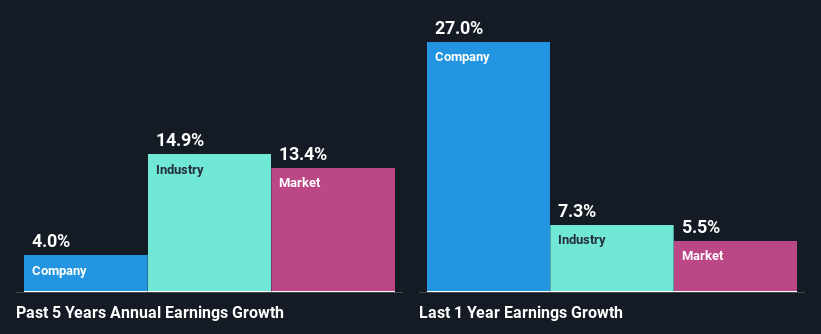Can Mixed Financials Have A Negative Impact on Axis Real Estate Investment Trust's 's (KLSE:AXREIT) Current Price Momentum?
Most readers would already know that Axis Real Estate Investment Trust's (KLSE:AXREIT) stock increased by 1.1% over the past week. However, we decided to study the company's mixed-bag of fundamentals to assess what this could mean for future share prices, as stock prices tend to be aligned with a company's long-term financial performance. Specifically, we decided to study Axis Real Estate Investment Trust's ROE in this article.
Return on equity or ROE is a key measure used to assess how efficiently a company's management is utilizing the company's capital. In simpler terms, it measures the profitability of a company in relation to shareholder's equity.
Check out our latest analysis for Axis Real Estate Investment Trust
How Do You Calculate Return On Equity?
Return on equity can be calculated by using the formula:
Return on Equity = Net Profit (from continuing operations) ÷ Shareholders' Equity
So, based on the above formula, the ROE for Axis Real Estate Investment Trust is:
8.1% = RM230m ÷ RM2.8b (Based on the trailing twelve months to March 2024).
The 'return' is the income the business earned over the last year. One way to conceptualize this is that for each MYR1 of shareholders' capital it has, the company made MYR0.08 in profit.
What Has ROE Got To Do With Earnings Growth?
We have already established that ROE serves as an efficient profit-generating gauge for a company's future earnings. Depending on how much of these profits the company reinvests or "retains", and how effectively it does so, we are then able to assess a company’s earnings growth potential. Generally speaking, other things being equal, firms with a high return on equity and profit retention, have a higher growth rate than firms that don’t share these attributes.
Axis Real Estate Investment Trust's Earnings Growth And 8.1% ROE
When you first look at it, Axis Real Estate Investment Trust's ROE doesn't look that attractive. Although a closer study shows that the company's ROE is higher than the industry average of 3.2% which we definitely can't overlook. Yet, Axis Real Estate Investment Trust has posted measly growth of 4.0% over the past five years. Bear in mind, the company does have a low ROE. It is just that the industry ROE is lower. Hence, this goes some way in explaining the low earnings growth.
We then compared Axis Real Estate Investment Trust's net income growth with the industry and found that the company's growth figure is lower than the average industry growth rate of 15% in the same 5-year period, which is a bit concerning.
Earnings growth is an important metric to consider when valuing a stock. The investor should try to establish if the expected growth or decline in earnings, whichever the case may be, is priced in. By doing so, they will have an idea if the stock is headed into clear blue waters or if swampy waters await. Is AXREIT fairly valued? This infographic on the company's intrinsic value has everything you need to know.
Is Axis Real Estate Investment Trust Efficiently Re-investing Its Profits?
Axis Real Estate Investment Trust seems to be paying out most of its income as dividends judging by its three-year median payout ratio of 71% (or a retention ratio of 29%). However, this is typical for REITs as they are often required by law to distribute most of their earnings. So this probably explains the low earnings growth seen by the company.
Additionally, Axis Real Estate Investment Trust has paid dividends over a period of at least ten years, which means that the company's management is determined to pay dividends even if it means little to no earnings growth. Our latest analyst data shows that the future payout ratio of the company is expected to rise to 95% over the next three years. However, the company's ROE is not expected to change by much despite the higher expected payout ratio.
Conclusion
On the whole, we feel that the performance shown by Axis Real Estate Investment Trust can be open to many interpretations. Specifically, the low earnings growth is a bit concerning, especially given that the company has a respectable rate of return. Investors may have benefitted, had the company been reinvesting more of its earnings. As discussed earlier, the company is retaining a small portion of its profits. That being so, according to the latest industry analyst forecasts, the company's earnings are expected to shrink in the future. To know more about the latest analysts predictions for the company, check out this visualization of analyst forecasts for the company.
Have feedback on this article? Concerned about the content? Get in touch with us directly. Alternatively, email editorial-team (at) simplywallst.com.
This article by Simply Wall St is general in nature. We provide commentary based on historical data and analyst forecasts only using an unbiased methodology and our articles are not intended to be financial advice. It does not constitute a recommendation to buy or sell any stock, and does not take account of your objectives, or your financial situation. We aim to bring you long-term focused analysis driven by fundamental data. Note that our analysis may not factor in the latest price-sensitive company announcements or qualitative material. Simply Wall St has no position in any stocks mentioned.
Have feedback on this article? Concerned about the content? Get in touch with us directly. Alternatively, email editorial-team@simplywallst.com

 Yahoo Finance
Yahoo Finance 
